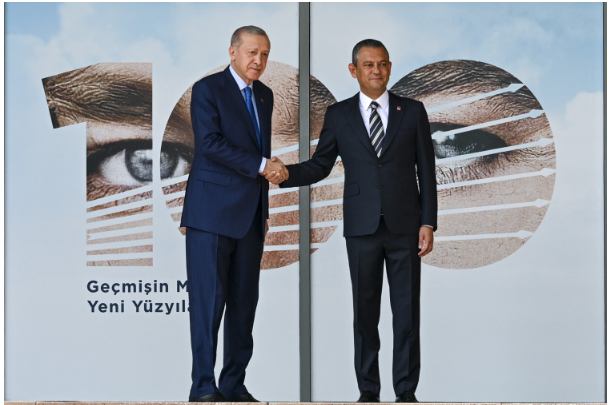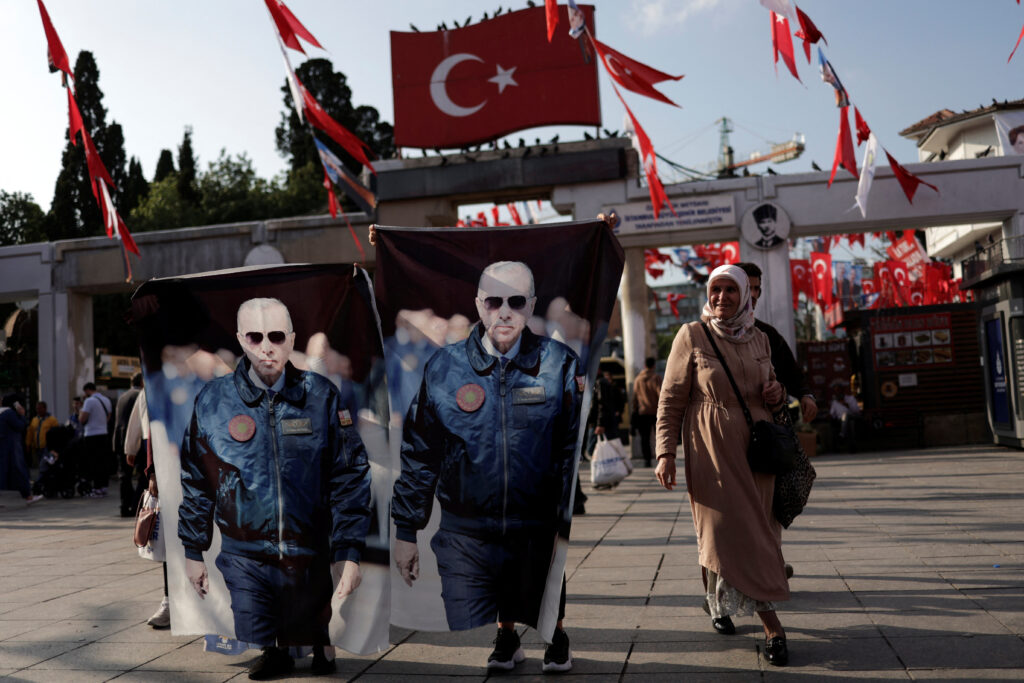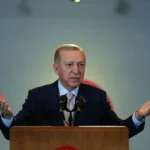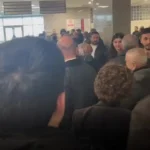The Turkish original of this article was published as
Laik cemaatin zaman dışı evreni on 13th September 2015.
For the last few days I have been having some quiet, tranquil time surrounded by an incredible man-made green in a South Aegean “village.” My heart keeps sinking whenever I watch the news on television. I go out in the garden to stare blankly at the sky. I think and think…
Our youth was taken up by dreams of revolution. What naïve kids we were. Leave aside trying to ride microscopic, socially alienated parties in an attempt to attain vast utopias. Consider a movement that has risen from within the sociological majority, and which has been riding the crest of a historical wave to become the hope of millions. Just look at how difficult, how costly it has proved for even this movement to effect a change of régime, to snatch power from the hands of a minority, and to turn to those global forces that we in our know-all clichés used to call “moribund capitalism” in order to tell them that “we too have a say in this region.”
As my mind keeps wandering along these lines…
I am surrounded by human caricatures. This is a settlement where both houses and people are all “white.” You may have guessed that everybody reads Sözcü. And it is around “Tayyip” that all daily talk revolves.
The other day there was a power failure. The man sunning at the head of the pool gave up struggling with the paper that the wind was blowing in his face to yell furiously at an acquaintaince on the balcony: “Because Tayyip gets no votes from this area, he goes and cuts the electricity.” The other cut this balcony conversation short: “Who knows what else is going to happen to us if things keep going like this.” Another woman was complaining as she offered a glass of water to the gardener: “Tayyip is having the schools open late; what does he care about education?” On another occasion a mixed group of men and women were having tea and biscuits in the garden of the most sociable auntie of the entire gated community while discussing the state of the nation. A male voice was describing how much it had bothered him to encounter women with head-scarves for the first time in the fish restaurant that he had been going to for years. A unisex kind of voice hoary from smoking too much expressed its worried approval: “Now they are everywhere.” Yesterday, too, a mosquito-like uncle was trying to tell his captive Austrian neighbor in broken English, with every sentence punctuated by a “crazy,” that it was “Tayyip” who had got us stuck with all these Syrian refugees. After Dağlıca, of course, talk has been turning more to the ongoing terror. People are angry. They don’t like “the Kurds.” But they are also all confused. They keep firing sentences in all directions, starting with “it is Tayyip who has been spoiling these Kurds,” and concluding with “he has launched this war to stay in power.”
All this might not seem very interesting to you. You might find it all too familiar, much too shopworn. And you wouldn’t be too far off the mark. But still, this state of fixation is worth spending some thought about.
There has arisen a huge contrast in Turkey between the dynamics of political life and the petrification of a secularist sociology. You might think that certain views have been politically superseded, but they are very much alive and kicking in the secularists’ world of belief and emotion. It is as if the new moves and discursive changes that we observe in the sphere of politics do not touch open this other, social world. It is inhabited by this seemingly over-politicized crowd. They keep talking politics all the time. But it is also a set of mind that has wholly closed itself off to comprehending real political processes and to being influenced by them. It is an outlook that has turned so naïve and childish as to believe in the existence of “an enemy capable of cutting their electricity in retaliation for no votes.” They are actually apolitical in the fullest sense of the word.
It doesn’t even matter whether they believe their own words or not. What is really significant is that “arguments” which would be regarded as shamefully ignorant in any other community have come to constitute the esteemed and respected language of socialization in their world. Make up any ludicrous statement about Tayyip and electricity, and all doors will be opening before you. It has the same kind of value as the password for a spiritual sect or secret society. A password does not have to be meaningful. Neither should it be forcing you to think. The only requirement is to memorize it, to learn it by heart, and not to forget.
The communication mechanics thereby established never leave any need to ponder the truth, to show any interest in what may actually be happening, or to feel and express doubts of any kind. On the contrary; anything that you say that is not stereotypical, that does not abound in clichés, may suddenly render you an outsider and a suspect when you least expect it. This is not a familiar kind of “political opposition.” For it has no reason to do any “political thinking.” It is a weird kind of network where everyone joins arm in arm to de-link from the political and help each other resist the flow of time.
It is as if they have never heard of anything called racism. The only thing they feel about all forms of existence other than their own mode of “respectability” is fear and anger. As helpless onlookers sidelined by a menacing course of events which they can neither analyze nor comprehend, they keep trading enraged vacuities to take refuge in each other. They sorrow as they behold their lost paradise from the outside. They are stock still, frozen in time with Sözcü in their hands. Reading its oversize “Tayyip” headlines they delude themselves into believing that they are “thinking about politics.” Actually it is more like delirious ravings which they are not conscious of. At times they have the illusion that deep down they still own this country. They would like to believe that if it weren’t for Erdoğan they would be able to go back to their good old days. They are child-like. Truly, they resemble kids whose toys have been taken away from them.
In his article on “Regarding democracy as no more than a game” [Demokrasiyi oyun saymak, 3rd September 2015], Etyen Mahcupyan noted that secularists were not real “subjects.” In their minds, they keep scripting democracy as if it were a game in which they could govern society as a minority. A game that their protectors can terminate whenever they grow bored with it. Subsequently, Mahcupyan reminded everyone — capable or incapable of seeing it — of the following momentous truth: “The post-modern world is quite conducive to depriving those that would make a game of democracy of their would-be ‘toy.’ In Turkey, too, this is what the AKP movement has done. Since 2002, democracy has no longer been a game, and the secularists have no longer been an ‘independent variable’ in the dynamics of social change.”
Yes, they aren’t. And they are paying for their inability to become subjects by pulling each other into greater and greater superficiality, by abandoning all reason, and by hopelessly disconnecting from the dynamics of this country.
It is not as a contribution to “society news” that I have chosen to depict this rather ordinary setting. The sociological profile involved has quite some relevance for the notion of a “political center.” In a country that has deep historical fault-lines running through it, it is very difficult to achieve a no-conflict situation in the absence of a strong political center. And the formation of such a strong political center closely depends on the various sociological components’ ideo-political outlook.
I believe that we have a lot to discuss with regard to the formation of a new political center in Turkey and its underlying sociological problems.
To be continued next week [see the author’s as yet untranslated Değişim ve siyasi merkezin inşası sorunu, 16th September 2015].
Yazıyı beğendiysen, patronumuz olur musun?
Evet, çok ciddi bir teklif bu. Patronumuz yok. Sahibimiz kar amacı gütmeyen bir dernek. Bizi okuyorsan, memnunsan ve devam etmesini istiyorsan, artık boş olan patron koltuğuna geçmen lazım.
Serbestiyet; Türkiye'nin gri alanı. Siyah ve beyazlar içinde bu gri alanı korumalıyız. Herkese bir gün gri alanlar lazım olur.


















